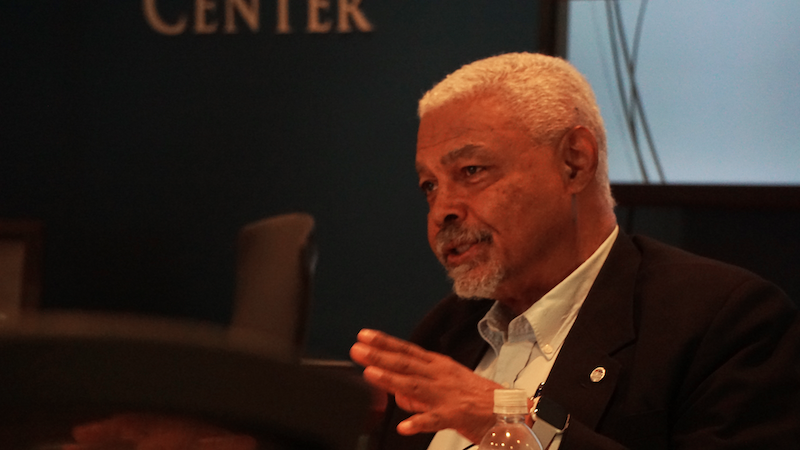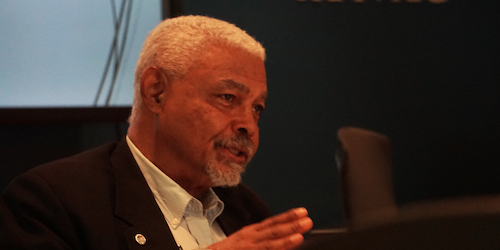From Mars to Venus: My Journey from Soldier to Diplomat
I experienced a bigger culture shock moving from the Defense to the State Department than I did as a young Black Texan in Germany in the 1960s.
By AMBASSADOR CHARLES RAY | FEBRUARY 18, 2024

For a long time, I viewed my five decades of U.S. government service as one career. Not until I retired in 2012, after 20 years in the Army and 30 years in the Foreign Service — and was comfortably out of government harness for a few years — did I realize that I’d completed two distinct and very different careers.
In the Army, I had a variety of jobs, from public affairs to psychological operations to unconventional operations. In the Foreign Service, my work’s scope ranged from consular affairs to political reporting to refugee issues to management. Although it might seem that my career trajectories in those organizations were similar, the environments in the government agencies to which they belong, the Departments of Defense and State, respectively, had little in common.
A joke I often heard after joining the Foreign Service in 1982 was that the Pentagon was from Mars and State was from Venus. As with many jokes, there was a lot of truth in it — at times, I felt like I’d landed in an alien universe. I experienced a bigger culture shock moving from one department to the other than I did as a young Black man from Texas in Germany in the 1960s. While both departments are mission-oriented, their approach to the mission differs markedly even today. The Pentagon’s approach is linear, with discrete start and end points. State’s approach is non-linear, because managing diplomatic relations between and among countries is a never-ending mission with no D-Day.
As a result, employees in the two departments have developed different attitudes over time. Even with Americans’ notorious short-term, quick-fix mentality, the way people at State approach international problems sometimes appears like foot-dragging to those at Defense, and people at the Pentagon often come across as rash and impatient to diplomats.
During my first overseas Foreign Service assignment, in China, I had to rein in my desire to get things done as quickly as possible, and to realize that whatever I was doing at the time was part of a larger, long-term mission of maintaining effective bilateral relations, not an end in itself. In Thailand in the late 1980s, I often had to obtain specific information about drug-smuggling organizations, which became just a tile in the larger mosaic of U.S.-Thai relations. I couldn’t just forget about those organizations and move on. The need for information continued, as did the drug trade.
Contrast this with my mission as a staff officer in Vietnam in the late 1960s, monitoring and reporting on the activities of U.S. reconnaissance teams scouting and surveilling enemy territory. The information was provided to combat units to help them plan their operations, whose mission was to seek out and destroy the enemy units and installations in those areas. Once we identified a target and reported its size, composition, location and activity, we moved on to the next target.
The first-ever textbook in diplomatic practice
“Superbly qualified practitioners relate from personal experience manifold perspectives of diplomatic conduct and practice.”
— John Negroponte, former U.S. Deputy Secretary of State
“An indispensable tool, ‘Diplomatic Tradecraft’ helps to develop complex skills.”
— Cristina Gallach, former U.N. Undersecretary General
“There is no better introduction to diplomacy currently in print. It deserves to become a standard text for would-be professionals.”
— Philip Zelikow, Stanford University
Another difference between the State and Defense cultures involves how people approach their jobs. When your aim is linear — destroy an enemy unit or occupy a piece of territory — you plan for the maximum amount of resources to achieve the goal and apply them at the point where they will have the optimum effect. Everyone participating in the mission knows what the goal is and works toward it. If, once an operation begins, the situation changes, more resources are applied to deal with it. For example, if the enemy reinforces a position after the reconnaissance, and there is more opposition than was planned for, reinforcements are requested, and rarely are such requests denied. When the mission is accomplished, resources not expended are shifted to another goal.
At State, on the other hand, there are seldom enough resources to fully accomplish day-to-day tasks, and when demands increase, the department is used to making do with existing funds. A case in point was the situation in the early 1990s, after the Soviet Union collapsed and we decided to establish diplomatic relations with its former republics. The Pentagon would have gone to Congress and asked for more money and people. The State Department, however, stood up 14 new embassies by taking positions away from existing posts elsewhere in the world, and without requesting additional funding.
The impact of that decision was painfully felt in the Foreign Service. When I was deputy chief of mission (DCM) in Sierra Leone in the mid-1990s, we didn’t have a single political or economic officer, a USAID director and a defense attaché, because those positions had been diverted to the new embassies. Amid a civil war following a military coup, with a fractious civil society demanding elections, and rebels supported by a neighboring dictator, my regular job of managing the mission and acting as the ambassador’s alter ego was challenging enough. But I also had to do political and economic reporting, supervise an USAID contractor, who ran humanitarian programs for Sierra Leoneans, and oversee military assistance programs. Not only did the ambassador and I have to fight for every penny we could get, but we often had to fend off attempts to reduce the paltry budget we did get.
A decade later, I was detailed from the State Department to the Office of the Secretary of Defense to serve as a deputy assistant secretary. I discovered that the mission of the office I ran had tripled in the past decade. After a budget review and a request for adjustment, we received a five-year budget increase exceeding $60 million.
The most jarring difference between the two organizations, to which I never quite adjusted, has to do with their attitudes toward education and training. During my 20 years in the military, I was not only encouraged to pursue higher education, but through generous leave policies and financial assistance, the Army facilitated it. I had joined with a high school diploma and left with a graduate degree. In the Foreign Service, on the other hand, while tradecraft and language training was excellent, many colleagues were reluctant to take long-term educational assignments, such as those at the war colleges. They were concerned that training would take them off their career track and might damage their promotion prospects.
My own inclination, however, was to take advantage of every possible opportunity, including the National War College, which I chose rather than a second DCM tour, and which gave me my second graduate degree. When I was assigned to the Bureau of Political-Military Affairs at the State Department in the early 1990s, I took early-morning French classes to acquire an additional foreign language, even though I didn’t have to. And during my detail assignment at the Pentagon in the mid-2000s, I took leave to attend a senior-officer course at the Army War College. My promotions seem to refute the belief that long-term training is not career-enhancing, a message the State Department should amplify.
The differences between State and Defense — both real and received — often mask the important fact that they complement each other. State would be hard-pressed to achieve its ongoing mission of maintaining effective long-term diplomatic relations without a strong military to back it up, and the military wouldn’t be able to go where it goes and do what it does without the diplomatic groundwork laid in advance of its deployments.
My journey from Mars to Venus, even if bumpy at times, was fantastic. State and Defense are like two sides of the same coin — each is devoted to ensuring our national security and prosperity, and it accomplishes that task in its own unique way.
Charles Ray is a former U.S. ambassador to Zimbabwe and Cambodia, deputy chief of mission in Sierra Leone and consul general in Ho Chi Minh City, Vietnam. He spent 30 years in the Foreign Service and now teaches at WIDA.
The opinions and characterizations in this article are those of the author and don’t necessarily represent the views of the U.S. government, the Diplomatic Diary or WIDA.




